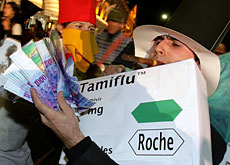Roche on track despite falling Tamiflu sales

Roche says sales of its bird flu drug Tamiflu plummeted by 60 per cent in the third quarter but the group was on track to meet its 2007 targets.
The Basel-based pharmaceuticals and diagnostics company reported nine-month sales of SFr33.95 billion ($28.77 billion). This is an increase of 12 per cent over the comparable period last year – twice the global market average.
Revenues from Tamiflu for the year to date at SFr1.57 billion have gone down by only two per cent.
“Revenue growth in the second half of last year, as we all know, was also driven by a peak in stockpiling orders for Tamiflu for use in the event of a pandemic,” commented Roche chairman and CEO Franz Humer in a statement on Tuesday.
“With those orders now filled, I am all the more pleased to report that our Pharmaceuticals Division continued its double-digit growth… fuelled by a broad and young portfolio of innovative medicines for cancer, hepatitis and osteoporosis.”
Analyst surprise
Commenting on the Tamiflu sales figures, analyst Denise Kepler at Landsbanki Kepler was a little surprised.
“The Tamiflu pandemic sales were even less than I had thought. On the other hand, obviously given the product cycle of a lot of the drugs, the story cycle we see for Roche over the next 12 months has more to do with clinical trials news flow than results,” she said.
Helvea analyst Andrew Fellows wrote in a note last week that Roche remained the brokerage’s “key pick in the European pharmaceutical sector thanks to its low level of patent expiry, in combination with a strong pipeline”.
Nine-month drug sales at Roche rose 14 per cent to SFr27.12 billion, just behind forecasts, underpinned by key cancer medicines like Avastin and Herceptin.
Avastin sales rose 41 per cent to SFr2.97 billion and Herceptin by 26 per cent to SFr3.59 billion.
Nine-month sales at Roche’s diagnostics business rose five per cent to SFr6.82 billion, in line with expectations.
Outlook maintained
Roche maintained its current profit growth estimate for the year. It expects core earnings per share to grow faster than sales in 2007, while revenue from pharmaceuticals and for the group is forecast to grow more than ten per cent.
In June, Roche made a hostile $3 billion takeover bid for Ventana, a leader in tissue-based diagnostics in the United States, but the offer of $75 per share was rejected by the Arizona-based company as too low.
Roche has refused to raise the price and has extended its tender offer for the outstanding shares of Ventana three times, most recently in September.
“We believe that the offer is fully priced and fair, attractive for the Ventana shareholders, and the ball is with Ventana,” Severin Schwan, the head of pharmaceuticals and the designated CEO told Reuters news agency.
swissinfo with agencies
In February, Roche announced that worldwide sales of Tamiflu (oseltamivir), for influenza, had continued to rise strongly in 2006, driven mainly by pandemic stockpiling, as governments increased their population coverage.
It said that since 2004 over 75 countries had placed orders for pandemic stocks of Tamiflu, with some purchasing enough to cover 25–50% of their populations.
It added that research into the most effective use of Tamiflu against the H5N1 virus was continuing, both at Roche and through cooperation with independent experts, the World Health Organization and other institutions.
32 cases of the H5N1 bird flu virus were diagnosed in 2005 and 2006, one on Lake Geneva and the rest in the region around Lake Constance.
Total bans on keeping poultry outdoors have been implemented twice in Switzerland: the end of October to mid-December 2005 and mid-February until the end of April 2006.
On Monday, Swiss lakeside areas became subject to a ban on keeping poultry outdoors over fears that bird flu could be transmitted from migrating wild birds. A one-kilometre zone around the largest lakes, including Lakes Geneva and Constance, are subject to the restrictions.
In October 2006 Switzerland became the first country to confirm it would stock a pre-pandemic vaccine against the human form of bird flu as part of its extended pandemic plan.
It has stockpiled two million doses of the antiviral drug Tamiflu and ordered SFr180 million ($150 million) worth of pre-pandemic and pandemic vaccines. The public has also been told to stock up on bird flu masks.

In compliance with the JTI standards
More: SWI swissinfo.ch certified by the Journalism Trust Initiative












You can find an overview of ongoing debates with our journalists here . Please join us!
If you want to start a conversation about a topic raised in this article or want to report factual errors, email us at english@swissinfo.ch.